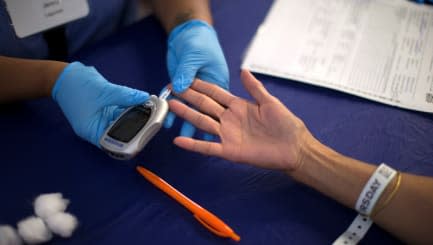7 ways diabetes affects your body

Type 2 diabetes can wreak havoc on your health and affect your body in many ways.
While lifestyle changes can help keep diabetes under control, many patients require oral medications or insulin injections as forms of treatment, too.
Type 2 diabetes is the most common type of diabetes, with around three million people in the UK diagnosed with the condition, as well as around 600,000 people suffering with it without knowing they have it.
See also: Skinny people might be at serious risk of type 2 diabetes after all
See also: 'Huge amount' to be done to raise awareness of diabetes, says Teresa May
If you suffer with type 2 diabetes, it means your body has insulin resistance, meaning your pancreas doesn't produce enough insulin or the body doesn't react properly to insulin.
Insulin is used by the body to manage glucose, or sugar, levels in the blood and to convert glucose into energy.
Over time, the high glucose levels in the blood may damage the nerves and leave you predisposed to atherosclerosis (narrowing) of the arteries that can cause heart attack and stroke, and damage the eyes and kidneys.
Diabetes can affect your body in many ways, including these seven factors: 1) It damages blood vessels; 2) And your nerves; 3) It can lead to vision loss; 4) It can lead to kidney disease; 5) It may cause sexual problems; 6) It doubles your risk of heart attack; 7) It doubles your risk of suffering a stroke.
Knowing how diabetes affects your body could help you look after yourself and prevent diabetic complications from developing.
A number of the effects of diabetes stem from the high blood pressure, high cholesterol levels and a lack of blood glucose control.
Classic symptoms of diabetes include increased thirst, a frequent need to urinate, fatigue, blurred visions and tingling or pain in the hands, feet and/or legs.
In the long-term, diabetes affects your blood vessels and nerves and could therefore affect any part of the body, although some areas are more prone, including those mentioned above.
Affects are often called diabetic complications, and these normally arise over a number of years of poorly controlled diabetes.
Complications can be kept at bay by sticking to a healthy diet, cutting down on sugar, avoiding smoking and drinking alcohol, and taking regular exercise to regulate blood sugar levels.
Seek medial advice if you have any of the symptoms or are concerned as diabetes testing and early treatment plans are important to prevent serious diabetes complications developing later on.



